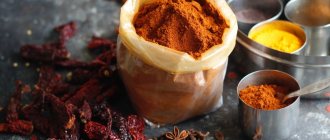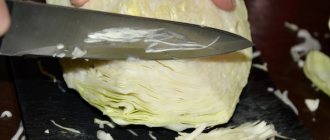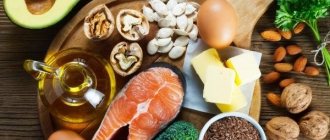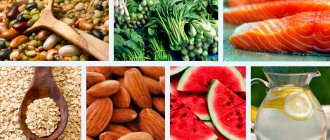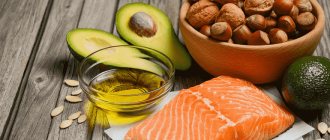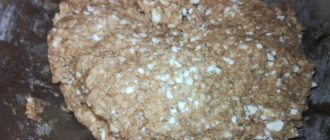Squids have recently become a common product in the diet of people who watch their diet. And they are quite affordable in price, so many who prefer high-quality protein, but at the same time dietary and low-calorie food, choose this seafood. It is offered for sale in frozen, canned, dried, dried form. Before you figure out why squids are useful, you need to understand what they are.
Read on topic
: The benefits and harms of canned foods
Squids on a diet
Many nutritionists recommend squid meat as a dietary product. Not only due to its low calorie content. Squid meat is also used during the diet because it removes excess fluid and cholesterol from the body. Squid should be eaten with fresh vegetables. There are few reviews about the squid diet. This is due to the fact that the diet is quite strict and few people can withstand it. In addition, it cannot be called popular, because it is not always possible to purchase high-quality squid meat. In our hypermarkets, squids are most often sold frozen or dried, while after any heat treatment the beneficial properties are lost.
Not only squids contribute to weight loss, more details: Crab diet - nutritionist’s opinion, advice.
Squid meat is low-calorie, 100 grams contains no more than 75 calories, but at the same time a complete amount of protein. Squid can be added to salads, dressed exclusively with low-calorie mayonnaise or special yogurt dressings, eaten with any side dish or cooked in soups. There are a great many low-calorie recipes using this product.
Advantages of the squid diet
The main advantage of using squid in a diet is the overall usefulness of the product. Rich in vitamins and microelements, it perfectly replaces meat products, reducing cholesterol levels in the body. Is it possible to eat squid on a diet all the time? Of course not. They need to be combined with vegetables and unsweetened fruits. This diet may be monotonous, but very effective in the fight against excess weight.
Squid meat contains almost no fat and is digested easily and quickly. Squids do not contain purine bases, which, according to nutritionists, are toxic. Additional beneficial properties of squid during the diet include stabilization of the gastrointestinal tract.
Many diets prohibit eating potatoes due to the presence of a large amount of starch in them, but there is another opinion, more details: Potato diet - the opinion of a nutritionist, advice.
Of course, a squid mono-diet cannot be healthy. However, the uniform inclusion of squid meat in a low-calorie diet menu can have a beneficial effect on the entire body as a whole and on the weight loss process in particular.
Squid diet reviews
First of all, this diet is not suitable for people who have allergic reactions to any seafood. In addition, this diet is contraindicated for people who have any serious health problems.
The diet is very strict and not varied at all, so only very stubborn people can stick to it. It belongs to mono-diets and has a huge number of restrictions. This is why the squid diet receives reviews, often negative, both from those who have been on this diet and from professional nutritionists. The squid diet can be followed for no longer than one week. Before starting a diet, you should definitely consult your doctor.
Thus, according to nutritionists, squid can be used in diets as a worthy replacement for any meat product. It is important to combine squid with vegetables. The beneficial properties and pleasant taste may appeal to many women who want to maintain their body and health in excellent condition.
Eating seafood during a diet allows you not only to lose weight, but also get a whole range of useful substances and microelements. This affects not only the appearance, but also the functioning of all internal organs and systems. Numerous options for dietary squid recipes will diversify any menu, making it healthy, tasty and effective.
Seafood and vegetable salad
When dieting, squid is also added to a variety of salads. To make one of these dishes you will need the following ingredients:
- 150 grams of thoroughly cleaned squid meat;
- 40 grams of lettuce;
- Octopus meat in the amount of 150 grams;
- 70 grams of peeled asparagus;
- 80 grams of scallop meat;
- 1 fresh cucumber;
- 80 grams of salmon meat;
- 3 cherry tomatoes;
- A small piece of pepper;
- 80 grams of shrimp meat;
- 20 grams of red onion;
- 5 tablespoons olive oil;
- A small amount of lemon juice, honey and salt.
The process of preparing the salad is not complicated:
- You need to wash the lettuce leaves. They are torn into small pieces by hand and placed in a salad bowl.
- The onion is cut into neat half rings. The vegetable slices are transferred to a salad bowl.
- The pepper is cut into thin strips.
- Peel the cucumber. The vegetable is cut into small pieces.
- Slices of pepper and cucumber are added to the salad bowl.
- In a separate container, combine olive oil, honey, salt, and lemon juice. The resulting dressing should be added to the vegetable salad.
- Seafood is cut into small pieces. They are fried in a preheated frying pan for at least three minutes.
- Along the edges of the plate are placed cherry tomatoes, neatly cut into two halves. Place lettuce in the center of the salad bowl. Pre-fried seas are carefully placed on top of it.
Squid and other seafood during a weight loss diet
Seafood is mostly low in calories. Thus, the energy value of squid is only 98 kcal, shrimp – 95 kcal, and octopus – 73 kcal/100 g.
At the same time, squid is a high-protein and low-fat product. The natural protein content is 19 grams out of 100, and fat is only 2.5 grams.
This type of shellfish is often used not only in dietary, but also in medical nutrition, due to its impressive chemical composition. Squids are rich in:
- taurine – an amino acid involved in the breakdown of lipids and increases the speed of transmission of nerve impulses in the brain;
- protein compounds that affect muscle tissue growth and regeneration;
- polyunsaturated fatty acids that regulate metabolism, as well as the functioning of the heart, brain and endocrine system;
- vitamins (ascorbic and folic acid, thiamine, tocopherol, pyridoxine);
- nutrients (iodine, copper, phosphorus, selenium, calcium, magnesium, zinc, iron).
The introduction of seafood, including squid, into the diet contributes to:
- reducing the level of bad cholesterol in the blood;
- normalization of blood pressure;
- restoration of hormonal levels in diseases of the thyroid gland;
- improving the functioning of the urinary system;
- increase in muscle tissue;
- increasing endurance and improving memory.
How many calories are in squid
When consuming this product, you don’t have to worry about exceeding your daily calorie intake: the energy value of squid is low. However, a lot depends on the cooking method. Boiled squid has the same calories, smoked squid has different calories. Let's go through familiar options for serving delicious shellfish (calorie content per 100 grams):
- Raw squid – 92 kcal;
- Boiled squid – 122 kcal;
- Fried squid – 174.6 kcal;
- Stewed squid – 97.6 kcal;
- Canned squid – 95 kcal;
- Torn squid – 181 kcal;
- Smoked squid – 242 kcal;
- Dried squid – 237 kcal;
- Dried squid – 248.67;
- Squid in batter – 188.8 kcal.
Can all seafood be considered low-calorie?
Seafood is a great alternative to meat protein. It is precisely because of their high protein content that they quickly satisfy hunger and are able to maintain a feeling of fullness for a long time. The combination of this quality with low calorie content makes squid an ideal diet product.
The calorie content of most seafood rarely exceeds the 100 kcal mark.
Getting rid of extra pounds with the help of your favorite products is simple and pleasant. An excellent example of this is squid for weight loss.

Benefits and calorie content of squid
Squid is considered one of the most valuable and low-calorie foods, which allows it to be used as part of therapeutic and dietary nutrition. The meat of this mollusk contains a large number of valuable components:
- easily digestible protein;
- taurine;
- polyunsaturated fatty acids;
- vitamins (C, E, PP, B1, B6, folic acid);
- macro- and microelements (phosphorus, iodine, calcium, copper, selenium, iron, zinc, sodium, magnesium, nickel, potassium).
Despite the fact that squid is filling, its calorie content is only 98 kcal. 100 g of meat contains 19 g of protein, 2.5 g of fat and 1.8 g of carbohydrates. It should be remembered that when other products are added (including vegetable oil for frying), the calamari content of squid increases sharply. Therefore, those who are on a diet are recommended to eat boiled or steamed carcasses.
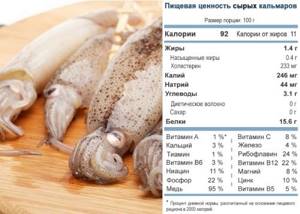
The benefits of squid for the human body are as follows:
- reducing the level of harmful cholesterol in the blood, increasing the elasticity of blood vessels, normalizing blood pressure in case of hypo- and hypertension;
- normalization of the thyroid gland;
- improving the functioning of the genitourinary system, removing excess fluid, eliminating edema;
- cleansing the body of heavy metal salts, waste, toxins;
- improvement of digestive processes, stimulation of gastric juice production;
- decreased blood glucose levels;
- development of muscle tissue;
- increasing endurance (mental and physical), improving memory.
The almost complete absence of fat makes squid a dietary dish that is quickly and easily digested. To appreciate all the benefits of this product, you need to choose fresh carcasses and cook them without adding oil, flavorings or flavor enhancers (in a saucepan, slow cooker, steamed). It is not recommended to buy industrially produced dried squid, as they contain a large amount of salt and other harmful components.
Mechanism of weight loss
The benefits of the product for weight loss are as follows:
- Squids are rich in protein, so eating them provides long-lasting satiety. Thanks to this, a person can eat according to a planned schedule without additional snacks, give up sweets and other addictive foods (fast food, processed foods, etc.).
- Squid meat contains a minimal amount of fat and carbohydrates. You can consume it at any time of the day (including for dinner), without exceeding the daily calorie intake.
- Extractive substances stimulate the production of stomach acid, helping to normalize the digestion process. The result is improved metabolism.
- With regular use of the product, excess fluid is removed from the body. Swelling goes away, which makes a person slimmer and more attractive.

How much protein is in squid?
A real treasure trove of protein is the squid carcass. The BJU of this product leans strongly towards the first element of the group, so the nutritional content of the shellfish is very high. The composition of raw squid (proteins, fats, carbohydrates) per 100 grams is as follows:
- carbohydrates – 0.14 g;
- proteins – 17.88 g;
- fat – 2.3 g.
Let's compare how much protein is in boiled squid, because with the numerous nutritional properties of the product, few would agree to consume the shellfish raw. Characterizing boiled squid, BZHU (per 100 grams) can be represented as follows:
- carbohydrates – 2 g;
- proteins – 21.2 g;
- fat – 2.8 g.
The original composition of squid after heat treatment is almost completely preserved, unlike frying (proteins are lost, fats and carbohydrates increase) or smoking (proteins increase along with calorie content).
Is squid a protein or a carbohydrate? When prepared correctly, the first without the second. Boiled squid is a recipe for the purest, easily digestible, low-calorie protein booster.
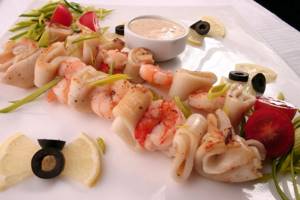
Advantages and disadvantages
Losing weight using squid has its advantages:
- Diversity. The diet can be prepared for 1, 3, 7 and 30 days. It may include only squid (fasting day), as well as other low-calorie foods (vegetables, lean fish, fruits, shrimp, herbs, etc.).
- Fast weight loss. Diets allow you to lose excess weight quickly and without harm to your health.
- Saturation. Thanks to the large amount of protein, squids are perfectly satiating and reduce cravings for sweets and other unhealthy foods. They have a pleasant taste, which allows them to be added to a wide variety of dishes.
- Improved health. The components of the product have a beneficial effect on the condition of all systems and internal organs. The predominance of squid meat in the diet makes a person more energetic and reduces the manifestations of chronic and other diseases.
The only drawback of such diets is that they are not suitable for everyone. They imply a number of restrictions, which makes them harmful and even dangerous for some people (nursing and pregnant women, people with chronic diseases). Squid is one of the foods that can cause allergic reactions. Therefore, before including meat in your diet, you need to make sure there is no individual intolerance.
What are the benefits of squid?
First of all, it is a very tasty product, especially when prepared skillfully. Like all seafood, squid is rich in iodine, potassium, phosphorus, etc. Iodine is important for the health of the thyroid gland and general metabolism. Phosphorus is necessary for strong bones and active brain function. Potassium, magnesium and iron are necessary for the normal functioning of the cardiovascular and nervous systems. Selenium contained in squid helps remove heavy elements from the body. Selenium in combination with vitamin E has a moderate diuretic effect on the body. Taurine is involved in fat metabolism and, accordingly, improves metabolic processes. Taurine is used as dietary supplements. It is also necessary in the diet of pets.
By eating squid meat, you can feel full, not feel hungry, get the amount of protein your body needs, and not worry about calories. It should also be noted that the meat of these mollusks is beneficial for people training muscles or those involved in bodybuilding. For such people, this is pure natural, easily digestible protein. As already mentioned, squids are quite low in calories; a person on a diet can afford them.
Rules for losing weight
To lose weight quickly on a diet, you need to lead a healthy lifestyle. Following these recommendations will help with this:
- give preference to healthy and low-calorie foods (you will have to give up everything sweet, fatty, starchy and canned);
- eat more often, but in small portions (4-5 times is enough);
- maintain a drinking regime (drink at least 1.5 liters of water per day);
- minimize salt intake;
- be physically active (walking, running, dancing, doing aerobics, etc.).
Delicious soup recipe
The step-by-step recipe for preparing the dish is as follows:
- First you need to chop the onion;
- Then water and finely chopped potatoes are added to the container;
- Boil the vegetable until tender; Add squid and salt to the soup;
- After three minutes the fire is turned off;
- After cooking is finished, carefully chopped celery is added to the soup;
- Grate the carrots on a grater with small holes. It is fried in a pan along with garlic, cut into small pieces.
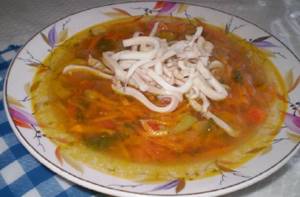
How much can you lose?
The speed of weight loss depends on your lifestyle. With proper nutrition and moderate physical activity, you can lose up to 1 kg per day (calamari diets do not exceed 1000–1500 kcal). However, doctors do not recommend losing weight at a rapid pace, as this has a negative impact on your health. In order not to harm the body, you should calculate the number of calories needed to maintain weight and subtract 15–20% from it. The resulting figure will indicate the calorie intake that will ensure gradual and safe weight loss.
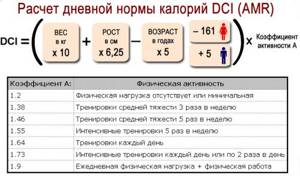
The minimum number of kilograms that can be lost in 1 month is 5. Some people manage to lose 8–10 kg in 4 weeks.
Squid diet
There are several types of diets designed for different periods of time. When choosing one of them, you need to start from your state of health and your goals. If the goal is to get rid of the maximum number of kilograms, you should give preference to a long-term diet. If you need to eliminate swelling and excess fluid before an important event, a fasting day or a three- or seven-day diet is suitable.
Fasting day
Fasting days imply the most monotonous diet. The most difficult option is to eat only squid (preferably boiled). If desired, you can include other protein products in your diet - chicken breast, kefir or shrimp.
To get rid of the feeling of hunger during fasting days, you should drink more fluid. This can be green tea without sugar or pure still water.
For 3 days
With a diet designed for 3 days, it is allowed to eat squid (500 g each) and low-fat kefir (500 ml each). This amount is divided into 4-5 servings and eaten throughout the day.
To an unprepared person, such nutrition may seem complicated, but it gives excellent results. To avoid breakdowns, it is recommended to drink more water.
For 7 days
The most strict option is considered to be a diet designed for 1 week. Throughout the 7 days, the diet remains unchanged:
- Breakfast: vegetable salad with squid, freshly squeezed carrot juice.
- Lunch: boiled squid, apples.
- Dinner: squid, feta cheese (70 g), unsweetened green tea.
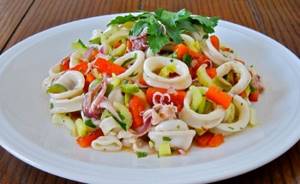
This diet allows you to get rid of 3–5 kg and wean your body off large, high-calorie meals. To maintain the results, you need to adhere to proper nutrition constantly. A sharp increase in caloric intake will lead to excess weight gain and side effects (heaviness in the abdomen, pain and discomfort in the stomach, flatulence, constipation, etc.).
For a month
A monthly diet will help you achieve maximum results. In this case, the menu looks like this:
- Breakfast No. 1: low-fat cottage cheese (up to 5%), tea without sugar, any fruit (except grapes, bananas).
- Breakfast No. 2: 1 glass of freshly squeezed fruit juice (store-bought products will not work).
- Lunch: 2 tbsp. l. rice, squid soup, steamed chicken cutlets.
- Dinner: boiled squid (2–3 pcs.), 2 chicken eggs.
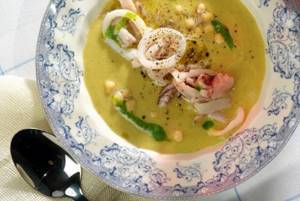
You need to exit the diet gradually so as not to expose your body to stress. At week 1, vegetables are added to the diet, at week 2 - fruits, at weeks 3 and 4 - lean meat. Junk foods (flour, fatty foods, confectionery, etc.) can be consumed no earlier than 5 weeks and in minimal quantities.
In 4 weeks of proper nutrition you can lose 8–10 kg. Moderate physical activity will help make your diet more effective: walking, swimming, jogging, fitness classes, etc.
Reviews
Anastasia, 36 years old, Lipetsk: “I couldn’t lose weight for a long time due to an eating disorder. When I learned from a friend about the squid diet, I decided to try it. For 7 days I ate food from the proposed menu: squid, vegetable salads, cheese, fruit. The diet turned out to be difficult, but I still managed to lose weight. In 1 week I lost 5 kg of excess weight.”
Ekaterina, 25 years old, Rostov-on-Don: “I work in the modeling business, so I can’t gain weight. I have eliminated all unhealthy foods from my diet, but on weekends I allow myself some fast food and sweets. Then I arrange a fasting day on squid and kefir, which allows me to get rid of 500–800 g of excess weight and return my figure to slim.”
Leonid, 44 years old, St. Petersburg: “I always ate fatty, high-calorie foods for dinner until I learned that this had a bad effect on my figure. I replaced my usual dishes with boiled squid (with vegetables, rice or other seafood). After 1 month of eating this way, I noticed that my jeans became too big. When I stepped on the scale, I couldn’t believe my own eyes: in 30 days I lost 4 kg of excess weight. I recommend the diet to everyone who cares about their figure and wants to be healthy.”
Irina, 23 years old, Moscow: “I wanted to lose weight with the help of squid, but it turned out that I was allergic to seafood. I had to call an ambulance and inject an antihistamine. Don’t eat unusual foods in large quantities, otherwise everything could end badly.”
Dietary squid recipes
Squid is a popular seafood that is included in many dishes (including dietary ones). You can cook it in different ways: steamed and grilled, in a saucepan, slow cooker, oven. The main thing is not to use oil.
Squid carcasses are suitable for making soups, salads, and main courses. It should be remembered that this seafood does not like long heat treatment. The longer it sits on the stove, the tougher and more tasteless it becomes.
Salads
Salads with seafood are light, satisfying, and low in calories. They can be eaten even in the evening (without bread and no later than 1 hour before bedtime).
Squid salad is prepared according to one of the following recipes:
- Boil the squid, cut into rings. Mix with grated apple and celery root. Season with sesame oil and a little soy sauce.
- Boil the squid, cut into pieces. Add bell pepper, sweet onion and parsley. Season with olive oil.
- Mix the finished squid with chopped bell pepper and radishes. Add celery greens and some boiled shrimp. Season with olive oil.
Salad with boiled squid for weight loss
Mushrooms go well with seafood, so add champignons to them and it will be very tasty. In addition, mushrooms are a source of protein, so your appetite is instantly interrupted. 2-3 spoons of the prepared dish is enough to fill you up. Champignons can be used canned, pickled or fresh. If you find frozen ones, wait until they are completely thawed before cooking.
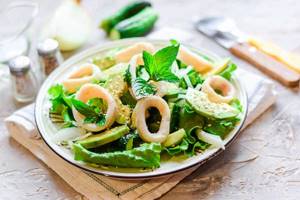
Compound:
- 100 g squid;
- 100 g champignons;
- boiled egg;
- small onion;
- 50 g hard cheese (low fat);
- 1.5 tbsp. vegetable oil;
- bell pepper for decoration;
- spices, salt.
How to cook:
Hard boil an egg, peel and cut into large pieces. Boil the squid, then chop into thin half rings and mix with eggs. Grind the cheese on a coarse grater and add to the rest of the ingredients.
Drain the water or juice from the mushrooms, place in a colander and squeeze well. If you squeeze it poorly, they will shoot during frying. Chop the onion into small cubes. Heat a non-stick frying pan over medium heat and fry the mushrooms until golden brown. After a while, add the onion and continue frying for another 5-6 minutes.
Contraindications
Like any other product, squid is prohibited from being consumed if there are contraindications. The main one is individual intolerance (including allergy to seafood). If present, even a small portion can cause unwanted reactions in the form of redness and itching of the skin, rashes and even anaphylactic shock. For those who have never eaten the product before, it is recommended to start with a small amount. If there are no side effects, the serving size can be increased.
Other contraindications to frequent consumption of squid are inflammatory processes in the body, as well as exacerbations of chronic diseases.
Pregnant and lactating women and patients with various diseases should not adhere to strict diets. Those who are concerned about their health should consult a doctor before switching to a new diet.

